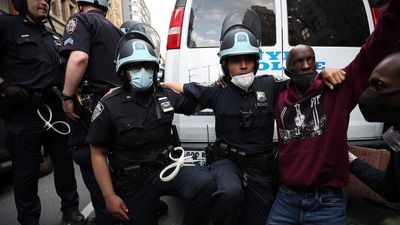Don't Be Fooled By Police Officers Taking A Knee Alongside Protesters
Colin Kaepernick's nonviolent approach to bringing awareness to police brutality has been co-opted by police officers across the country as an empty gesture of solidarity alongside protesters.
Search "take a knee." Go on. Among the top stories associated with the search are headlines dedicated to police officers kneeling alongside protesters across the country. The stories are meant to convey a sense of hope and unity, contrasting the constant barrage of pictures and videos on social media showing officers using force against demonstrators protesting police brutality and the wrongful killing of George Floyd. Now, it's more likely that you'll see a video of Chief of Department Terence Monahan, New York City's highest-ranking officer, kneeling alongside protesters and hugging them, alongside pictures and videos of protesters struck by tear gas canisters in the eye or rubber bullets in a single social media scroll.
As sincere as the act presents itself, it feels like an empty gesture: a very vapid display of symbolic virtue-signaling that tugs at the heartstrings and does nothing more. In that exchange the intent behind taking a knee is lost, the solidarity just as ineffective and useless as handing a cop a can of Pepsi.
Colin Kaepernick's take a knee protest has moved beyond the green fields of football stadiums since he first kneeled in 2016.
"I am not going to stand up to show pride in a flag for a country that oppresses black people and people of color," ex-San Francisco 49ers quarterback Kaepernick said in a post-game interview at the time. "To me, this is bigger than football and it would be selfish on my part to look the other way. There are bodies in the street and people getting paid leave and getting away with murder."
Kaepernick was clear about what his nonviolent form of protest represented, and yet it was still intentionally distorted to represent something it wasn't. For many, it was seen as unpatriotic and un-American: a travesty against the United States anthem and flag and, by extension, other signifiers attached to the idea of America like the military and police. Donald Trump further contributed to the outrage Kaepernick — and other athletes who kneeled — faced when he told owners to get any "son of a bitch" who didn't stand for the anthem off the field during a campaign rally in 2017. He followed this up with a series of tweets where he further warped the intent of Kaepernick's protest, writing: "If a player wants the privilege of making millions of dollars in the NFL, or other leagues, he or she should not be allowed to disrespect.......our Great American Flag (or Country) and should stand for the National Anthem."
Although Kaepernick was out of the NFL during the 2017 season, the take a knee demonstrations hit a peak that year, dividing football players, coaches, and owners, as well as fans. That division became more complicated as teams handled the protesting differently. Some skipped the anthem altogether, while some were arm-in-arm as other teammates sat on the bench or knelt. The Dallas Cowboys attempted to cater to both sides when the team — along with owner Jerry Jones — locked arms and took a knee before standing for the anthem during a game against the Arizona Cardinals. That same year, the NFL and the Players Coalition reached an agreement for the league to provide financial support to players' community activism endeavors. By 2018, owners ruled that players could no longer kneel during the anthem without facing punishment — they could, however, remain in the locker room during the anthem — only for the policy to be put on hold after the NFL Players Association filed a grievance against it. The idea of taking a knee was hallowed out in the NFL, and this occurring again as cops co-opt it amid protests.
The irony of this is that police forces throughout the country were some of Kapernick's primary detractors when he first started kneeling. In 2016, the San Francisco Police Officers Association demanded an apology from 49ers president and CEO Jed York and NFL commissioner Roger Goodell. They criticized Kaepernick for perpetuating a "false narrative" about police brutality. That same year, the Santa Clara Police Officers Association threatened to boycott 49ers games over Kaepernick's protests, and referred to his comments on police brutality as anti-police, as well as "insulting, inaccurate and completely unsupported by any facts." And although there have been instances of officers supporting Kaepernick, police forces in this country still continue to operate in a way that maintains the oppressive policies that people are protesting against at this very moment.
This is why cops kneeling alongside protesters is so hollow, and why people see it as nothing more than a public relations tactic. That some protesters have even been present for these moments of performative solidarity, only to see police then use force against them, speaks to this.
To kneel is to support and understand that America's police system needs to be reformed and, ideally, abolished. Without pledging to dismantle the practices and procedures that continue to lead to the unnecessary death of people across the country, cops taking a knee alongside protesters serves no real purpose and further dilutes the meaning of what kneeling has come to represent.
